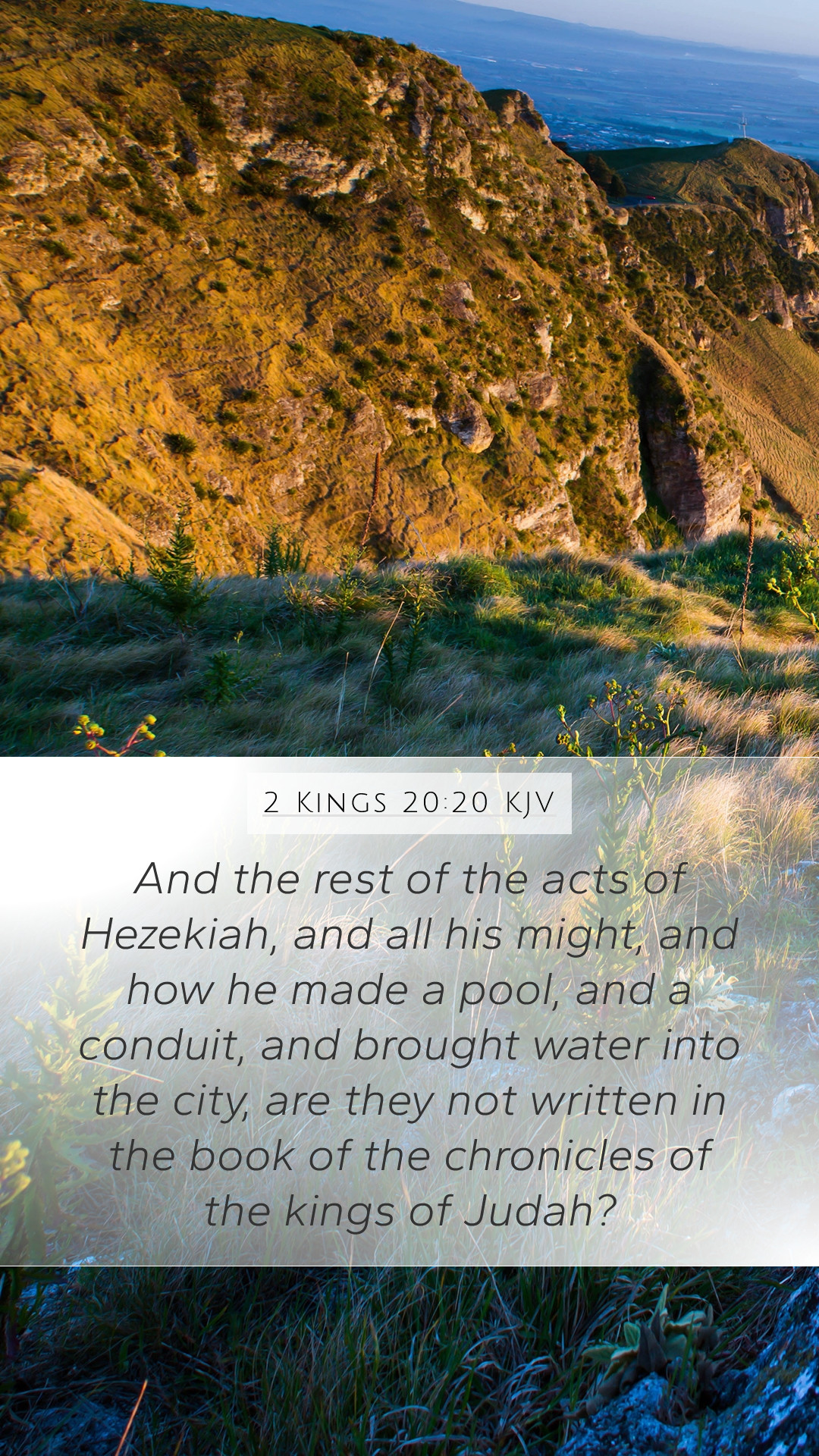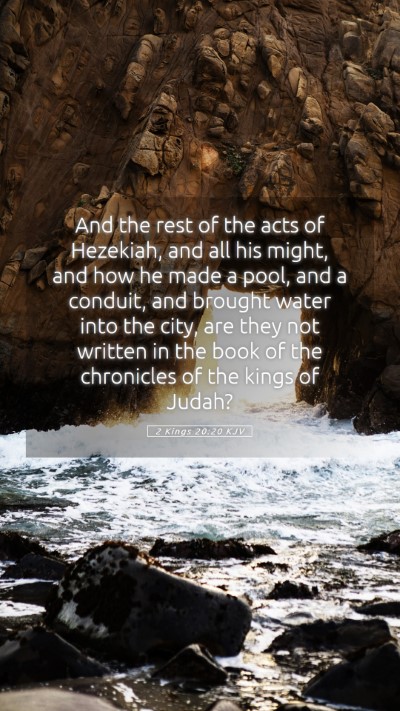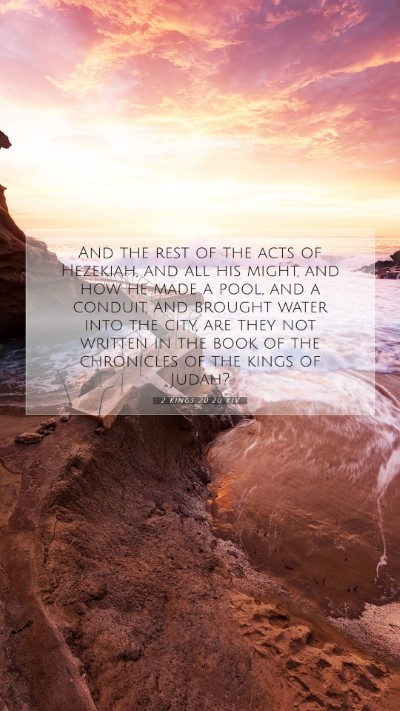Old Testament
Genesis Exodus Leviticus Numbers Deuteronomy Joshua Judges Ruth 1 Samuel 2 Samuel 1 Kings 2 Kings 1 Chronicles 2 Chronicles Ezra Nehemiah Esther Job Psalms Proverbs Ecclesiastes Song of Solomon Isaiah Jeremiah Lamentations Ezekiel Daniel Hosea Joel Amos Obadiah Jonah Micah Nahum Habakkuk Zephaniah Haggai Zechariah Malachi2 Kings 20:20 Meaning
What is the meaning of 2 Kings 20:20?
And the rest of the acts of Hezekiah, and all his might, and how he made a pool, and a conduit, and brought water into the city, are they not written in the book of the chronicles of the kings of Judah?
2 Kings 20:20 Bible Verse Meaning
Understanding 2 Kings 20:20
Bible Verse: 2 Kings 20:20: "And the rest of the acts of Hezekiah, and all his might, and how he made a pool, and a conduit, and brought water into the city, are they not written in the book of the chronicles of the kings of Judah?"
Overview
This verse concludes the account of King Hezekiah’s reign and highlights his achievements, particularly the construction of a water conduit that facilitated access to water during sieges and droughts. This commentary synthesizes insights from public domain sources, offering a comprehensive understanding of the verse.
Bible Verse Meanings and Interpretations
2 Kings 20:20 serves as both an endnote to the narrative of Hezekiah and a reminder of the historical context in ancient Judah. The verse encapsulates significant theological and practical insights:
- Historical Significance: Hezekiah is noted for his reforms and restoration of proper worship in Judah, marking his reign as one of notable righteousness (Matthew Henry).
- Human Legacy: Hezekiah's tunnel—a feat of engineering—bears testament to his leadership and the ingenuity of the people during his reign (Albert Barnes).
- Spiritual Reflection: The “book of the chronicles of the kings of Judah” suggests that God’s people should record both God’s mighty deeds and human endeavors, a biblical principle that underscores accountability and divine providence (Adam Clarke).
Insights from Public Domain Commentaries
Matthew Henry's Commentary
Matthew Henry emphasizes Hezekiah's legacy as not only a king but also a servant of the Lord. He notes that the physical acts of building a conduit and a pool symbolize the deeper spiritual act of seeking sustenance from God. Hezekiah’s achievements were not mere political victories but manifestations of divine favor and wisdom during a time of crisis.
Albert Barnes' Notes
Albert Barnes highlights that the reference to the “pool” and “conduit” is significant as it demonstrates Hezekiah’s foresight in preparing Jerusalem to withstand siege. He points out the practical importance of water supply to the city’s survival. Barnes relates Hezekiah's work to the themes of preparation, foresight, and reliance on divine guidance, thus giving readers valuable lessons for spiritual preparation and reliance on God.
Adam Clarke’s Commentary
Adam Clarke provides additional insight by discussing the role of historical records in Scripture. He emphasizes that documenting events, such as Hezekiah’s reign, serves as a reminder of God’s faithfulness and guidance through history. Clarke urges readers to understand the significance of historical context in interpreting the Scriptures and draws connections to broader biblical narratives.
Application of 2 Kings 20:20
This verse invites modern readers to reflect on their own contributions to their communities and the legacies they leave behind. Here are some practical applications:
- Community Building: Just as Hezekiah contributed to his city’s infrastructure, individuals today are called to invest in their communities through service and support.
- Preparation through Faith: The lesson of preparing for adversity by relying on God resonates today. Believers can look for ways to deepen their spiritual resources.
- Documentation of Faith: Keeping records of God’s blessings and acts in our lives can encourage future generations, just as the chronicles did for Judah.
Cross References
This verse can be understood in light of other scriptures that affirm its themes:
- 2 Chronicles 32:30: This verse also references Hezekiah’s water system and achievements.
- Isaiah 38:5: The Lord's promise to Hezekiah after his prayer.
- 2 Kings 19:29-30: God’s assurance of protection for Jerusalem during troubling times.
Conclusion
In summary, 2 Kings 20:20 not only recounts the historical actions of Hezekiah but also speaks to timeless principles relevant to believers today. This verse serves as a reminder of the importance of faith-driven actions and the impact one can have on their community, as reflected in biblical teachings and through historical contexts. When engaging in Bible study, understanding scripture through the lens of such commentaries can deepen one’s appreciation and application of the Word in daily life.
Further Bible Study Resources
For those interested in exploring deeper, consider the following tools and resources:
- Bible Study Guides: Utilize guides that focus on Old Testament narratives to enrich your understanding.
- Online Bible Study Forums: Engage in discussions with others studying the same passages for collective insights.
- Historical Context Lessons: Explore lessons that delve into the historical backdrop of Biblical figures like Hezekiah.


